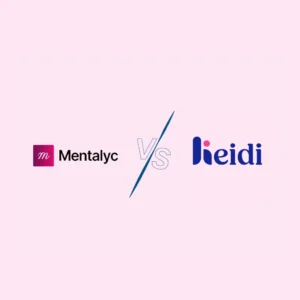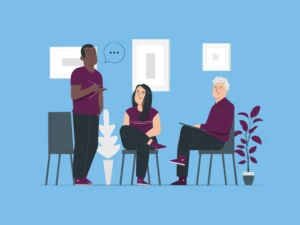As a therapist, it is essential to recognize that the journey of learning and growth never stops. To give your clients the best care, you must keep informed of the latest research and connect with other therapists.
By committing to lifelong learning and networking with your peers, you’ll gain invaluable insights, find inspiration from mentors and colleagues, and become an even better clinician. This is especially true in today’s rapidly changing world, where new technologies and treatments are constantly emerging.
Whether you’re a novice or a seasoned professional, embracing a mindset of continuous improvement and collaboration will enrich your career and enhance the lives of those you serve. So, let’s embark on this exciting path of professional development together!
Networking: What is it, and why is it Important in the Mental Health Field?
What is Networking?
Networking involves building relationships, sharing knowledge, and opening up opportunities by connecting with other professionals in your field. In the mental health industry, networking includes introducing yourself to other therapists, counselors, psychologists, and social workers.
Here are some helpful networking tips:
- Attend industry conferences, events, and local meetups to make personal connections with people who share your interests. Engage them in conversation and look for common ground. Trade business cards and follow up to stay in touch. Drop an email, comment on social media, or suggest a meeting for coffee. Nurturing relationships leads to a robust professional network.
- Join online communities like private Facebook groups, LinkedIn, and Reddit subs. Participate in discussions, ask questions, and offer your expertise. Over time, these digital connections can lead to in-person collaborations and referrals.
- Build genuine connections by showing interest in others. Focus on listening, not just promoting yourself.
- Set up informational interviews with therapists you admire. Ask them about their career path and experiences in the field. Let them know you’re looking for mentors and would appreciate any advice or guidance they can offer.
- Consider organizing a local meetup or study group. This demonstrates leadership in your field and allows people to come together, learn from each other, and build a support system.
Why Should You Network?
Developing your professional network is a valuable investment in your career. It can enhance your ability to care for clients and reduce feelings of isolation within your profession. By dedicating time and effort to your network, you can unlock numerous opportunities and become an even better therapist. As a therapist, nurturing your network is crucial to achieving your professional goals. For therapists, networking has many significant benefits:
- Job opportunities: Hear about job openings before they’re advertised or get referrals from your connections.
- Mentorship: Connect with more experienced therapists who can advise you on challenges, career growth, and starting a private practice.
- Resource sharing: Trade tools, assessments, workbooks, and other resources that you’ve found helpful.
- Referrals: Build genuine relationships that lead to exchanging client referrals and cross-promotion.
- Reduced isolation: Connecting with like-minded professionals combats the isolation that can come with a career as a therapist.
Best Practices for Networking for Mental Health Professionals
Build Your Online Presence
If you’re a therapist, having an online presence is important. Begin by setting up profiles on LinkedIn, Facebook, and Twitter. You can also create a basic website to showcase your expertise, qualifications, areas of specialization, and contact details. This will make finding you online easier for potential clients and referral sources.
Attend Local Events
To connect with other mental health professionals in your area, seek out networking events hosted by your state counseling association, local nonprofits, hospitals, and community clinics. Introduce yourself to other attendees, exchange contact information, and follow up to express your interest in connecting further. Additionally, consider volunteering your time or skills to get involved in the community.
Continuously Learn
As mental health professionals, we must commit to ongoing learning and development. Take continuing courses on diversity, ethics, diagnosis, and treatment approaches. Read books and journal articles. Join forums to discuss ideas with your peers. Continuously improving your knowledge and skills will make you a better clinician and allow you to provide the best care for your clients.
How Can Networking Advance Your Career as a Therapist?
Networking Opens up Opportunities
Networking is critical to being a therapist, as it can open doors to new job opportunities, mentorships, collaborations, and potential clients. Attending industry conferences, joining online communities, and connecting with local professionals are all effective ways to expand your network. It’s always wise to keep an open mind and see where new connections may take you.
Share Knowledge and Get Advice
As a therapist, connecting with other professionals at different experience levels can be very beneficial. Networking provides opportunities to share insights, exchange resources, and learn new skills from peers. For instance, you can recommend a book that has been helpful with a particular issue or seek advice on a complex case. Building a supportive network of fellow therapists can significantly contribute to your professional development.
Build Your Referral Network
Expanding your private practice involves building relationships in your community by connecting with physicians, schools, and support groups to share your expertise and the issues you treat. Offer free consultations or educational talks and always have business cards available. As a therapist, your clients are your best source of new referrals.
Word-of-mouth referrals from happy clients can be very effective, so ask if they feel comfortable recommending you to others. Focus on providing excellent service and building concrete relationships with them. Ask them to spread the word about your practice to people in their networks and offer an incentive like a free initial consultation or a referral discount.
Stay Up-to-Date with Trends
The mental health field is constantly evolving. Networking helps ensure you learn and implement the latest evidence-based treatments. Connecting with others exposes you to new resources, interventions, and ways of conceptualizing clients’ issues. You’ll discover emerging focus areas and gain a broader perspective on the field.
Recommended Conferences, Associations, Online Communities for Therapists, and Resources
Attending live events, participating in associations, and connecting on online platforms can provide you with valuable insights to better serve your clients. It’s crucial to continuously learn and build relationships to ensure professional growth and maintain an ethical and compassionate practice. While nothing can replace in-person interactions, web-based tools can be used responsibly to enhance networking and provide new avenues for learning.
Conferences
Well-known organizations such as the American Counseling Association (ACA), American Psychological Association (APA), and National Association of Social Workers (NASW) hold annual conferences with numerous activities, such as keynote speakers, panel discussions, workshops, and poster sessions that showcase the latest research and techniques.
Attending these large-scale events will allow you to connect with professionals who share similar interests, explore new resources, and come away with innovative ideas to enhance your practice. *While the major annual conferences like APA and ACA can be pricey, many offer student rates and scholarships.
Professional Associations
As a therapist, joining professional associations such as the APA, ACA, or a division specializing in your field can bring many benefits, including online communities, conferences, and continuing education opportunities. These associations offer national and local events, webinars, and online courses that provide CE credits.
Additionally, membership fees often include practical resources like journals, newsletters, and legal help, making it a valuable investment for your career. Consider exploring these options to expand your network and enhance your education as a therapist.
Online Communities
Social networks and forums allow you to collaborate with colleagues. Various online communities across the world cater to mental health professionals. These digital communities are great for asking questions, sharing knowledge, and advertising your services. Therapists can connect and learn from each other in many forums and online communities. It’s best to look for groups specific to your therapy modality or target client group. These digital communities permit sharing referrals, discussing trends in the field, and crowdsourcing advice.
Webinars and Podcasts
Therapists can access various affordable online learning resources, including webinars, podcasts, and video courses—PDResources, TherapySites, and DigitalChalk offer on-demand webinars approved for CE credits. MOOC platforms like Coursera and Udemy also provide courses on therapy techniques and related skills. These options offer the convenience of learning from home or the office. CE is not always costly, as many free or inexpensive webinars and podcasts are available on various platforms.
- PESI, a leading CE provider, offers live and on-demand webinars for under $50 on many topics.
- The Thoughtful Counselor podcast features expert interviews on counseling theories, techniques, ethics, and diversity.
- The Social Work Podcast discusses policy, research, theories, and trends in social work, psychology, and human services.
AI Technology for Therapists
Thanks to the AI revolution entering the therapy industry, therapists can now use AI technology to enhance patient care. With AI capabilities, therapists can personalize treatment, monitor patient progress, and receive valuable support to improve assessment and diagnosis.
For example, the Mentalyc platform empowers therapists to efficiently document their progress notes using various templates that cater to the requirements of different evidence-based therapeutic methods. Therapists can use AI technology to enhance their professional growth, improve therapeutic interventions, and ultimately achieve better patient outcomes. Sign up for Mentalyc to spend more quality time with your clients and less time writing progress notes.
As a therapist, staying connected with a supportive community and continuously learning to grow personally and professionally is essential. Even though the job can be challenging, networking and keeping up with the latest techniques and treatments can help maintain your enthusiasm for this fulfilling work. By sharing stories and advice, exploring new modalities, and learning from experts, therapists can improve their practice and well-being while benefiting their clients. Committing to networking can enhance skills, knowledge, connections, visibility, and, ultimately, the ability to serve clients. Therefore, therapists should prioritize these practices to thrive, improve, and never stop growing.
FAQ
Why invest time in networking?
As a therapist, networking and pursuing CE may seem like an unnecessary hassle on top of an already demanding schedule. However, making an effort to strengthen your connections with other professionals and keep your knowledge and skills up to date has significant benefits for you and your clients.
- Networking opens you up to new job opportunities, mentorship, and collaboration. You never know when a connection may lead to an ideal job opening or the chance to partner with another therapist. Forming relationships with others in your field also allows you to exchange insights and resources that improve your practice.
- CE courses teach you the latest therapeutic techniques and approaches. The mental health field constantly evolves, and CE ensures you provide the most effective, culturally-sensitive care for your clients. You’ll gain valuable knowledge about diagnoses, assessments, and treatments you can apply immediately.
- Both networking and CE help combat burnout by reinvigorating your passion for the work. Learning new skills and theories or collaborating with like-minded professionals can reignite your motivation and remind you why you pursued this career.
While finding the time for these activities may require some sacrifice, the rewards for your practice and clients make the investment worthwhile. Networking and CE will make you a better-informed, more competent therapist and open up opportunities that propel your career to new heights. The bottom line is that you owe it to yourself and those you serve to keep learning and stay connected.
What can a therapist do to increase inclusivity in their practice?
In today’s diverse and multicultural society, it is crucial for therapists to actively work towards creating an inclusive practice that welcomes individuals from all backgrounds. By embracing inclusivity, you enhance your ability to connect with a broader range of clients and foster an environment where everyone feels valued and understood.
Here are some strategies you can implement to increase inclusivity in your practice:
- Educate Yourself: Take the initiative to educate yourself about different cultures, identities, and perspectives. Attend workshops, read books, and engage in ongoing learning to deepen your understanding of diverse populations.
- Language and Communication: Be mindful of the language you use in your practice. Avoid making assumptions about a client’s background or identity, and use inclusive language that respects their preferences.
- Representation Matters: Ensure that your practice reflects the diverse communities you serve. Display culturally inclusive artwork, literature, and resources in your office. Consider diversifying your team by hiring therapists from different backgrounds who can bring unique perspectives to the practice.
- Accessibility: Make your practice physically and emotionally accessible to all individuals. Ensure your office is wheelchair accessible and has resources available for clients with disabilities.
- Collaboration and Partnerships: Build relationships with community organizations and support groups that serve marginalized populations.
- Continuing Education: Stay updated with the latest research and best practices in diversity and inclusivity. Attend conferences and seminars that focus on cultural literacy and intersectionality.
- Listen and Learn: Actively listen to your clients and seek their feedback. Create a safe and non-judgmental space where they feel comfortable sharing their experiences and concerns. Regularly reflect on your own biases and assumptions to ensure you provide unbiased care.
Why are resources vital to counseling?
Resources provide therapists with valuable tools and support to assist their clients effectively. By utilizing various resources, therapists can enhance their professional development, expand their knowledge base, and offer the best possible care to their clients. Here are some reasons why resources are essential counseling:
- Continued Learning: Counseling is a dynamic field that constantly evolves. Resources such as books, articles, and online courses allow therapists to stay updated with the latest research, therapeutic techniques, and evidence-based practices.
- Professional Growth: Resources, such as networking events, conferences, and workshops, allow therapists to connect with peers, learn from experts, and exchange valuable insights.
- Specialization: Resources enable therapists to specialize in specific areas of counseling. Therapists can develop trauma, addiction, or couples counseling expertise through specialized training, certifications, and resources.
- Client-Centered Approaches: Resources provide therapists with various therapeutic techniques, modalities, and interventions that can be tailored to meet the unique needs of their clients.
- Support and Inspiration: Counseling can be challenging, and therapists may face burnout or compassion fatigue. Resources, such as supervision groups, peer support networks, and self-care resources, offer therapists the support and inspiration they need to navigate the emotional demands of their work. These resources promote therapist well-being and help maintain a high standard of care for clients.
Disclaimer
All examples of mental health documentation are fictional and for informational purposes only.
Why other mental health professionals love Mentalyc

“Do yourself a favor, make your life easier. Use the tools that are readily available … I found Mentalyc to be one of the best tools that I’ve ever used.”
Licensed Marriage and Family Therapist

“It immediately changed my quality of life, personally and professionally. I went from 3–4 hours a week of notes to 1 hour at most … that alone is invaluable personally and professionally.”
Owner/Independently Licensed Marriage & Family Therapist (IMFT)

“For those who have hesitations … It is a lifesaver. It will change your life and you have more time to be present with your patients.”
Licensed Clinical Social Worker

“If I were recommending this software to a colleague, I would tell them that it is the best thing that they could do for their practice.”
Licensed Professional Counselor






